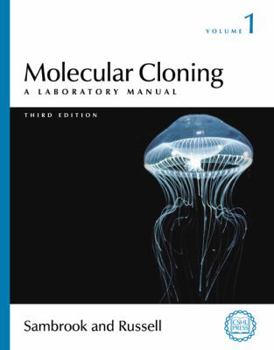Molecular Cloning: A Laboratory Manual
Select Format
Select Condition 
Book Overview
The first two editions of this manual have been mainstays of molecular biology for nearly twenty years, with an unrivalled reputation for reliability, accuracy, and clarity. In this new edition,... This description may be from another edition of this product.
Format:Paperback
Language:English
ISBN:0879695773
ISBN13:9780879695774
Release Date:January 2001
Publisher:Cold Spring Harbor Laboratory Press
Length:2344 Pages
Weight:4.35 lbs.
Dimensions:4.0" x 9.5" x 13.6"
Customer Reviews
5 ratings
the BIBLE of every biologist
Published by Thriftbooks.com User , 21 years ago
So few and so much to say about this bible of Biology at the bench...You'll really find everything you want in it, including the composition of all the buffers and solutions, the new protocols for high-tech biology (FLIM-FRET), some paragraphs about bioinformatics and more.Incredibly precise, this book is consequently a big book (3 huge volumes), so better know exactly wath you're looking for before opening it!The must have of every lab!
Excellent reference for all
Published by Thriftbooks.com User , 22 years ago
In this 3 volume set of books the authors summarize the most important laboratory protocols for DNA analysis and cloning. As someone involved in computational biology and mathematical gene sequence analysis, I was needing such a summary to get an idea of just how genetic engineering is actually practiced in the laboratory. The book is definitely written for those readers that are very experienced in these "wet" techniques, but it still could be perused profitably by anyone who is curious about genetic engineering. There is also an excellent website that owners of the books can go to and search for protocols and obtain updates and additions to the protocols. At the beginning of each chapter, the authors give an introduction to the protocols and this is of an enormous help to those readers with only rudimentary acquaintance with the laboratory procedures. Typically, this introduction contains an historical summary of the procedures as they were developed or discovered. One can only marvel at the ingenuity of the discoverers of these techniques. These introductions are fairly straightforward to read, even for those that are not experts in biochemistry.At the end of each chapter, the authors include an "information panel" that gives a more in-depth view of the biochemistry or genetics behind the procedures. These are summaries and are highly specialized, and are again meant for experienced readers. A very lengthy list of references is also included at the end of each chapter. Becuase of the size of this collection, space here does not permit a detailed review, so I will list some of the areas that I thought were particularly interesting or well-written (these coming from the introduction or the information panels only): 1. The DNA synthesis at the colE1 replicon and the interaction between RNAI and RNAII. 2. The discussion of electroporation and the physics behind this technique to introduce DNA into eukaryotic cells. 3. The discussion on the discovery of bacteriophage lambda. 4. The discussion (with diagram), of the assembly pathway of bacteriophage lambda. 5. The summary of the early analysis of DNA using electrophoresis and the different pulsed-field configurations used. 6. The anecdote on the discovery of the polymerase chain reaction. 7. The short discussion on computer-assisted design of oligonucleotide primers. 8. The discussion of oligonucleotide synthesis. 9. The flowchart detailing the preparing and screening of a cDNA library. 10. The history of the development of the methods to synthesize and clone cDNAs. 11. The detailed discussion of the molecular cloning of double-stranded cDNA. 12. The discussion on the methods to validate clones of cDNA. 13. The discussion on magnetic beads for affinity purification. 14. The discussion on the history of DNA sequencing and the different techniques to accomplish it, particularly the information panel on automated DNA sequencing. 15. The discussion of the different types of mutagenesis and the different
a biology graduate student
Published by Thriftbooks.com User , 22 years ago
Sambrook and Russell answer every question you could think of, and then some. This book is a goldmine of information, packed with protocols, but also filled with the extra information that transforms a simple set of instructions into an amazingly helpful how-to manual. The approach taken is that of an experimentor (ie. 'How to win the battle with RNase'--it really is a battle!), with hints and suggestions usually learned by watching an old pro. The information is well-organized, and very well illustrated to give a clear view of how an experiment is performed and especially the logic behind it. The manual also satisfies the insatiable curiosity of a scientist rather than a technician: how do pharmacological agents work? What are their structures? And the troubleshooting sections provide an invaluable resource. All in all, Sambrook and Russell have created an essential weapon in any scientist's artillery.
The bible of molecular cloning-updated
Published by Thriftbooks.com User , 22 years ago
Molecular cloning has been a lab staple for years. Now reprinted so you can update the old lab copy worn out by years of student use! Its a must have for any lab serious about molecular biology. Its also useful for student training. Many times there are simple explanations for the lab techniques we have adopted as dogma, but are unsure why. Molecular cloning has the answers and is a great resource. I highly recommend this book for its depth and breadth of protocols and guidance in the complicated realm of cloning!
A MUST-HAVE for all basic science researchers
Published by Thriftbooks.com User , 24 years ago
This set of three manuals is invaluable in the lab. Complete with almost every technique commonly used, and full useful tables and other data sets that save the user a lot of time. One key point though, is that a new edition is long overdue.




